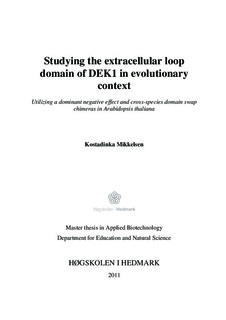| dc.description.abstract | DEFECTIVE KERNEL 1 (DEK1) is a highly conserved phytocalpain, embedded in the
membrane of all plant cells examined. Null alleles of dek1 are lethal and dek1 mutants have
shown that functional DEK1 protein is essential for proper development of both epidermal
cell layer in plant embryos, and for positional dependant aleurone cell formation during seed
development in maize, Arabidopsis and in tobacco plant. Transgenic Arabidopsis lines
overexpressing the membrane-anchored domain of DEK1 have shown a dominant negative
phenotype, suggesting that the AtDEK1-MEM plays role in the transmission of proposed
positional cues. In this research we used the dominant negative effect and cross-species
domain swap analysis in order to study conserved features of the extracellular DEK1-LOOP
domain in Arabidopsis thaliana in an evolutionary context. Two constructs, designed to
overexpress the AtMEM part of DEK1, where the LOOP domain was replaced by the DEK1-
LOOP sequence from other organisms, were successfully cloned and transformed into wild
type Arabidopsis thaliana background. Transgenic plants overexpressing the AtDEK1-MEM
construct, where the Arabidopsis loop sequence was replaced with loop from the unicellular
alga Mesostigma viride, showed phenotype frequencies significantly similar to those
observed in plants overexpressing the membrane-anchored domain of DEK1 that results in
dominant negative phenotype. These results suggest that the DEK1-LOOP of Mesostigma
viride most probably interacts with the same positional cues or the same family of proteins
as the DEK1-LOOP in Arabidopsis thaliana. Transgenic lines overexpressing the AtDEK1-
MEM construct, where the AtDEK1-LOOP sequence was replaced with DEK1-LOOP from
maize (Zea mays), only alleviated the dominant negative effect by exerting significantly
lower frequency of the respective phenotype, also compatible to phenotypic frequencies
observed in plants overexpressing the AtDEK1-MEM-DEL construct, where the loop
domain is deleted. These results suggest that the DEK1-LOOP domain could have
functionally diverged in species-specific manner between Arabidopsis and maize. However,
all these speculations are true only if the observed phenotypes are result of dominant
negative effect caused by the DEK1-LOOP domain. Q-PCR analyses of the transgenic
transcripts in two and five weeks old plants could not be correlated to the observed
phenotypes. | no_NO |
